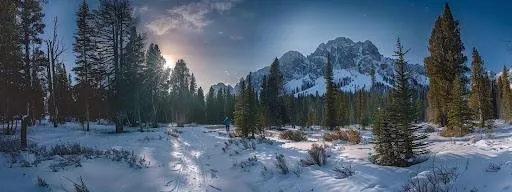
Winter Adventure Guide for the Sawtooth Mountains, Idaho
Winter Adventure Guide for the Sawtooth Mountains, Idaho
The Sawtooth Mountains in Idaho offer a winter wonderland for adventure seekers. This guide explores the best activities, from skiing through pine-covered slopes to ice fishing in frozen lakes. Visitors will discover how to plan their trip, find suitable accommodations, and stay safe while exploring the snow-covered landscape. Learn how to responsibly enjoy the Sawtooth Valley's natural beauty, including its glaciers and diverse wildlife, while protecting this unique ecosystem in the United States.
Introduction to Winter Adventures in the Sawtooth Mountains

The Sawtooth Mountains transform into a winter wonderland, offering diverse adventures in Central Idaho's Dark Sky Reserve. From exploring Galena Lodge to skiing Boulder Mountain, winter enthusiasts find endless opportunities. Pettit Lake and surrounding areas provide scenic backdrops for activities like rock climbing, showcasing the region's natural beauty and recreational potential.
Discovering Idaho's Winter Wonderland
The Sawtooth Mountains transform into a pristine winter wonderland, offering visitors a breathtaking escape in the heart of Idaho. Snow-covered forests and frozen lakes create a picturesque backdrop for outdoor enthusiasts exploring the Wood River Valley. From the serene banks of the Salmon River to the slopes of world-class ski resorts, the region provides diverse opportunities for winter adventure amidst its stunning natural beauty.
Highlights of the Sawtooth Mountain Range in Winter
The Sawtooth Mountain Range in winter offers a pristine wilderness experience for adventurers seeking diverse activities. From snow-capped peaks to frozen lakes, the landscape provides opportunities for cross-country skiing near Galena Lodge, ice fishing on the Salmon River, and exploring backcountry trails. Winter in Idaho's Sawtooth National Recreation Area showcases the region's natural beauty while offering unique recreational experiences for visitors.
Planning Your Winter Getaway to the Sawtooths

Planning a winter getaway to the Sawtooth Mountains requires careful consideration of optimal times for activities, transportation in snowy conditions, and preparation for mountain weather. Visitors exploring the granite peaks near Redfish Lake should understand access options and essential gear for winter adventures. This guide covers key aspects to ensure a safe and enjoyable experience in Idaho's stunning mountain range.
Optimal Times for Winter Activities
The optimal times for winter activities in the Sawtooth Mountains vary depending on the desired recreation. Ski resorts typically operate from late November through early April, offering prime conditions for downhill enthusiasts. For those seeking tranquil canyon exploration or wildlife viewing, including elk sightings, January and February provide the best opportunities with fewer visitors. Peak winter conditions for backcountry skiing and snowshoeing often occur in February and March, when snowpack is deepest and most stable.
Transportation and Access During Snowy Months
Access to the Sawtooth Range during winter requires careful planning and appropriate transportation. While some areas like Alturas Lake remain accessible by car, deeper wilderness areas near Snowyside Peak may necessitate specialized vehicles or alternative modes of travel. Visitors should be prepared for snow-covered roads and potential closures, especially when venturing towards remote locations like moraines or boat launch areas.
Preparing for Mountain Weather and Conditions
Winter weather in the Sawtooth Mountains demands thorough preparation for backcountry skiing and other activities. Visitors exploring Mount Regan or the White Cloud Mountains should monitor forecasts and pack appropriate gear for rapidly changing conditions. The Salmon River valley can experience extreme temperature fluctuations, requiring layered clothing and emergency supplies for safe adventures in this rugged terrain.
Exploring Winter Activities in the Sawtooth Mountains

The Sawtooth Mountains offer diverse winter activities for adventure seekers. From backcountry skiing on Thompson Peak to snowshoeing trails along the Middle Fork Salmon River, the region provides endless opportunities. Visitors can explore snowmobiling routes through pristine wilderness, tackle ice climbing challenges, and enjoy Nordic skiing tours across the Rocky Mountains landscape.
Backcountry Skiing and Snowboarding Spots
The Sawtooth National Recreation Area offers exceptional backcountry skiing and snowboarding opportunities. Adventurers can explore pristine powder fields and challenging terrain while surrounded by the breathtaking landscapes of the Sawtooth National Forest. Experienced backcountry enthusiasts often combine snowshoeing and skiing to access remote areas, navigating through snow-covered streams and forests for a truly immersive winter experience.
Snowshoeing Trails for All Skill Levels
The Sawtooth National Forest offers diverse snowshoeing trails suitable for all skill levels. Beginners can explore gentle paths near Bald Mountain, while advanced trekkers may venture into more challenging terrain shaped by historic mining activities. These trails provide unique opportunities to experience the winter landscape, with some routes doubling as mountain biking paths during warmer months, showcasing the versatility of the region's outdoor recreation options.
Snowmobiling Routes Through Pristine Wilderness
The Sawtooth National Recreation Area offers extensive snowmobiling routes through pristine wilderness, allowing adventurers to explore the stunning winter landscape. Riders can traverse groomed trails near the Big Wood River, accessing remote areas such as Horstmann Peak and other Sawtooth Mountain vistas. These routes provide thrilling experiences for snowmobilers while showcasing the natural beauty of Idaho's backcountry, including opportunities to observe wildlife and connect with the region's rugged terrain.
Ice Climbing Challenges for Adventurers
The Sawtooth Mountains offer challenging ice climbing opportunities for adventurers seeking winter thrills. Climbers can scale frozen waterfalls and snow-covered cliffs, with routes ranging from beginner-friendly to expert-level. The area's unique geology and cold climate create ideal conditions for ice formation, providing climbers with breathtaking views of the surrounding 756,000-acre wilderness. After a day of intense climbing, adventurers can relax in nearby hot springs, combining outdoor recreation with natural relaxation under the clear Idaho sky.
Nordic Skiing Areas and Tours
The Sawtooth Mountains offer extensive Nordic skiing areas and tours, providing winter enthusiasts with diverse terrain and breathtaking views. Trails near Galena Summit offer challenging elevation changes for experienced skiers, while gentler routes cater to beginners and families. Guided tours combine Nordic skiing with opportunities to observe wildlife and learn about the region's ecology, appealing to backpackers seeking a winter hiking alternative. These tours often pass by frozen whitewater rapids, showcasing the area's stunning winter transformation.
Accommodations and Dining in the Sawtooth Region

The Sawtooth National Recreation Area offers diverse accommodations and dining options for winter adventurers. Visitors exploring Mount Heyburn or Sawtooth Lake can find rustic lodges and cabin rentals near popular trailheads. Winter camping opportunities provide a unique experience for those seeking to summit peaks. Local eateries serve hearty meals to fuel outdoor activities throughout the region.
Rustic Lodges and Winter Cabin Rentals
The Sawtooth Wilderness offers a range of rustic lodges and winter cabin rentals, providing visitors with cozy accommodations amidst the stunning landscape of Central Idaho. Near Stanley Lake, visitors can find secluded cabins that offer breathtaking views of the surrounding cirques and snow-covered peaks. These rentals serve as ideal base camps for exploring the vast Sawtooth National Recreation Area, allowing guests to immerse themselves in the region's winter beauty while enjoying comfortable amenities.
Winter Camping Opportunities
Winter camping in the Sawtooth Mountains offers adventurous visitors a unique opportunity to experience the region's pristine wilderness. Campers can find designated sites near alpine lakes, providing access to stunning views of snow-covered peaks and opportunities for wildlife observation. The Wood River and Payette River valleys offer sheltered camping areas, while more remote locations in the Smoky Mountains challenge experienced winter campers with rugged terrain and serene isolation.
Local Eateries Serving Hearty Meals
The Sawtooth region offers a variety of local eateries serving hearty meals to fuel winter adventures. Visitors exploring the Pioneer Mountains can find rustic restaurants offering warm, filling dishes perfect for replenishing energy after a day of fly fishing or outdoor activities. These establishments often feature locally sourced ingredients and regional specialties, providing a taste of Idaho's culinary culture while supporting the area's economy.
Safety Tips for Winter Exploration

Winter exploration in the Sawtooth Mountains requires careful preparation and knowledge of safety protocols. This section covers essential gear for cold weather, avalanche risks, and safety measures for remote areas. Understanding these topics is crucial for a safe and enjoyable winter adventure in Idaho's rugged terrain.
Essential Gear Checklist for Cold Weather
Winter explorers in the Sawtooth Mountains need to equip themselves with essential gear for cold weather conditions. A layered clothing system, including moisture-wicking base layers, insulating mid-layers, and waterproof outer shells, forms the foundation of a winter gear checklist. Visitors should also pack high-quality gloves, warm hats, and insulated boots to protect against frostbite and hypothermia in the harsh mountain environment.
Understanding Avalanche Risks
Understanding avalanche risks is crucial for winter safety in the Sawtooth Mountains. Visitors should check local avalanche forecasts, recognize potential hazards, and avoid steep slopes during high-risk periods. Proper training in avalanche safety techniques, including use of beacons and rescue equipment, is essential for those venturing into backcountry areas. The Sawtooth National Forest provides resources and education programs to help visitors make informed decisions about winter travel in avalanche-prone terrain.
Staying Safe in Remote Areas
Staying safe in remote areas of the Sawtooth Mountains requires thorough preparation and communication. Visitors should inform others of their travel plans, carry emergency communication devices, and pack extra supplies in case of unexpected delays. Familiarizing oneself with the terrain, weather patterns, and potential wildlife encounters helps mitigate risks associated with exploring isolated regions of the Sawtooth National Recreation Area.
Protecting the Sawtooth Mountains During Winter Visits

Protecting the Sawtooth Mountains during winter visits is crucial for preserving this pristine wilderness. Visitors can contribute to conservation efforts by practicing responsible outdoor ethics and participating in local initiatives. These actions help maintain the area's natural beauty and ecological balance for future generations to enjoy.
Practicing Responsible Outdoor Ethics
Visitors to the Sawtooth Mountains during winter should practice responsible outdoor ethics to preserve the area's natural beauty. This includes adhering to Leave No Trace principles, such as packing out all waste, staying on designated trails, and respecting wildlife habitats. Responsible visitors also minimize their impact by avoiding sensitive areas, using established campsites, and properly disposing of human waste to protect the fragile alpine environment.
Participating in Conservation Efforts
Winter visitors to the Sawtooth Mountains can actively participate in conservation efforts to protect this unique wilderness. Volunteers can join organized clean-up events, help maintain trails, or assist in wildlife monitoring programs during the winter months. By supporting local conservation organizations and following guidelines set by the Sawtooth National Recreation Area, visitors contribute to preserving the area's natural resources and ecological integrity for future generations.
Conclusion
The Sawtooth Mountains in Idaho offer a diverse range of winter adventures, from backcountry skiing to snowshoeing, catering to all skill levels and preferences. Proper planning, including gear preparation and safety considerations, is crucial for a safe and enjoyable experience in this stunning winter wonderland. Visitors can immerse themselves in the region's natural beauty while supporting local economies through accommodations and dining options. By practicing responsible outdoor ethics and participating in conservation efforts, winter adventurers play a vital role in preserving the Sawtooth Mountains' pristine wilderness for future generations.

We support and protect conservation and recreation in the Sawtooth National Recreation Area.
Newsletter
Subscribe To Our Newsletter For Latest News
